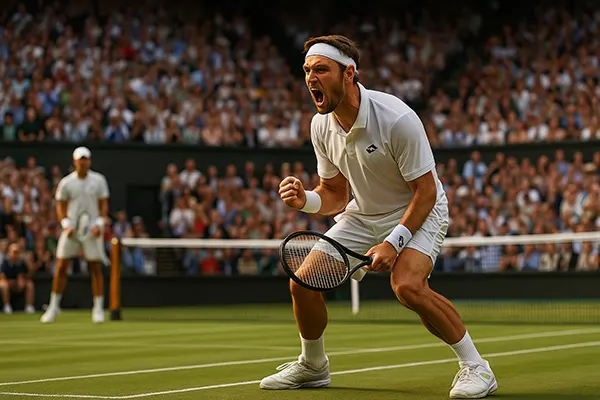Legendary Matches That Ended Dynasties: Final Games of Sporting Eras

In the world of elite sports, some matches go beyond scores and statistics — they symbolise the fall of great dynasties and close unforgettable chapters in sporting history. These events often carry emotional weight, not only for the athletes involved but also for millions of fans. In this article, we revisit three legendary games that marked the end of dominant eras across different sports disciplines.
The Fall of the Chicago Bulls in 1998
The 1997–98 NBA season marked the final chapter of the Chicago Bulls dynasty led by Michael Jordan, Scottie Pippen and coach Phil Jackson. Their last stand came in Game 6 of the NBA Finals against the Utah Jazz. Despite inner tensions within the organisation, the Bulls demonstrated their mental and physical dominance one last time.
Jordan’s game-winning shot with 5.2 seconds remaining — known simply as “The Last Shot” — sealed the championship. It was the Bulls’ sixth title in eight years and concluded one of the most powerful dynasties in basketball. This final game became a cultural and historic touchstone, especially after being immortalised in the documentary series *The Last Dance*.
After the season ended, management dismantled the team. Jordan retired (temporarily), Pippen and Dennis Rodman were traded, and Phil Jackson stepped away. The match against the Jazz wasn’t just a title win — it was the end of an era in professional basketball.
Legacy Beyond the Hardwood
The Bulls’ 1998 finale is remembered not only for the clutch performances but also for how it exposed the fragile balance between team success and organisational politics. The dynasty didn’t fall due to competition but due to internal management decisions. That context makes the game even more iconic.
Fans worldwide still debate whether that team could have won a seventh title. The myth surrounding the “what if” scenario has only grown with time, enhancing the cultural status of that final match.
Today, that era serves as a benchmark for evaluating modern basketball dynasties. It set the standard not just for athletic dominance but also for narrative richness that continues to influence basketball storytelling.
The 2014 World Cup Humbling of Brazil
Brazil’s national football team has long been a symbol of flair and dominance, but on 8 July 2014, the football world witnessed an unthinkable collapse. In the semi-final of the FIFA World Cup, hosted in Brazil, the home side faced Germany in Belo Horizonte. What unfolded became one of the most shocking matches in football history: a 7–1 defeat for Brazil.
The first 29 minutes saw Germany scoring five goals, leaving fans stunned. The absence of Neymar (due to injury) and captain Thiago Silva (suspension) was deeply felt. Yet nothing could explain the sheer collapse of structure, discipline and emotional control that Brazil displayed. This match ended the illusion of Brazilian invincibility on the world stage.
Though Brazil would later regain footing, the result marked the symbolic end of a golden era stretching from Pelé to Ronaldinho. The country’s approach to football — prioritising skill over structure — came under scrutiny, and a more pragmatic direction emerged in the years that followed.
The Psychological Fallout
More than a match, the 7–1 defeat became a national trauma. Psychologists in Brazil noted increased reports of anxiety and grief-like symptoms among fans. This wasn’t just about losing — it was about identity and legacy being dismantled in front of the world.
The match led to major structural reforms in Brazilian football, from youth development to defensive coaching philosophies. While Brazil continues to produce world-class talent, that match remains an inflection point between two eras: expressive football and calculated resilience.
To this day, the term “Mineirazo” — named after the stadium where the game took place — is synonymous with national sporting heartbreak, much like the “Maracanazo” of 1950. It marked the end of an idea more than just a team.

The End of Federer’s Wimbledon Reign in 2019
Roger Federer, one of the most iconic figures in tennis history, faced Novak Djokovic in the 2019 Wimbledon final. A five-hour marathon match ended with Djokovic winning 13–12 in the fifth set, after Federer failed to convert two championship points on his own serve.
Though Federer would continue to play, this match effectively ended his era of dominance at Wimbledon, where he had previously won eight titles. He was 37 years old, and despite his supreme form, time and younger competitors were closing in.
This final marked the last major in which Federer was considered a favourite. While his retirement would come in 2022, many fans and analysts see the 2019 final as the symbolic sunset of his prime era. The changing of the guard became undeniable.
Changing of the Tennis Guard
The 2019 final is often cited as the beginning of the Djokovic era. While Federer and Nadal still had moments of brilliance, the psychological and physical edge had shifted. Djokovic’s win signified the emergence of a more durable, methodical style replacing Federer’s elegance and artistry.
The match also sparked debates around longevity, adaptation and mental toughness. Federer played arguably better tennis for most of the match but lost due to small lapses and Djokovic’s unmatched composure under pressure.
In retrospect, this game didn’t just determine a champion; it showed the inevitable generational shift in men’s tennis. It was a moment where the sport acknowledged that no reign lasts forever, even for its greatest monarchs.




